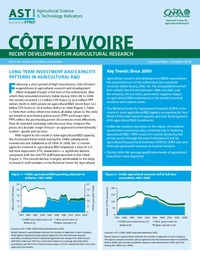Authors:
Stads, Gert-Jan; Doumbia, Sékou
Year:
2010
Publisher
International Food Policy Research Institute (IFPRI); and National Center for Agricultural Research (CNRA)
Back to:
During the 1990s, agricultural research in Côte d’Ivoire underwent major changes, following the launch of PNASA II, a project that was largely funded through a World Bank loan and which led to the establishment of CNRA. The December 1999 coup d’état and the outbreak of civil war in 2002, which caused CNRA to halt all operations in the northern, central, and western regions of the country, led to a withdrawal of World Bank support and to the early closure of PNASA II. These events had negative consequences for CNRA, a semi-private agency that is supposed to receive 40 percent of its annual funding from the national government and 60 percent from the private sector. However, the government has been unable to keep its commitment in full: in 2008, government funding covered only 15 percent of CNRA’s total expenditures. The private sector, through FIRCA, and internally generated resources accounted for the remainder of CNRA’s funding. Uncertainty as to whether government funding will come through or not makes it very difficult for CNRA to carry out its daily research and to engage in planning for the long term.
Despite these problems, CNRA’s funding levels for the last few years reveal a relatively stable trend.
FIRCA is a funding system, which is unique and exemplary in Africa. Through FIRCA, research has become more demand driven and the system’s solidarity mechanism ensures the availability of research funds to assist those agricultural production sectors in which the volume of raised subscription fees is low. In addition, Côte d’Ivoire is one of the few countries in the subregion that does not depend heavily on large-scale donor funding to pursue its agricultural research. This means that in setting its research priorities, it is less subjected to external pressures than are numerous other countries in West Africa.
With its 122 FTE agricultural researchers (and 16 FTE technicians holding MSc or BSc degrees), Côte d’Ivoire’s agricultural R&D capacity levels are generally speaking lower than those of many other countries in the subregion. This does not necessarily constitute a cause for concern because CNRA’s status as a semi-private institute has enabled it to rationalize both its program and its organizational structure: indeed, CNRA successfully maximizes its results by investing fewer resources
and avoids the pitfall of an overabundance of staff. So in spite of civil war and funding problems, Côte d’Ivoire’s agricultural research, and in particular that of CNRA, ranks among the best performing and most innovative in Africa.

